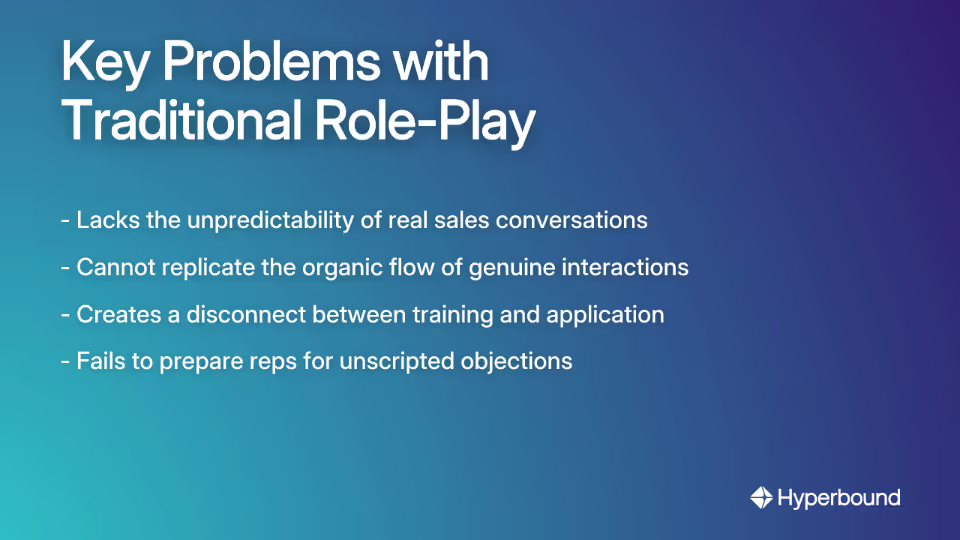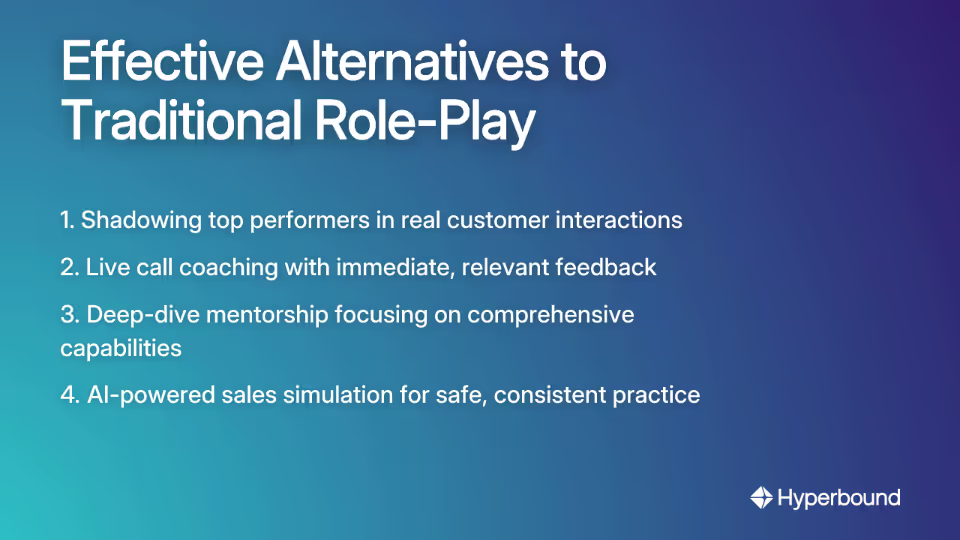
The sales manager announces, "Today, we'll be doing some role-playing exercises," and the conference room fills with that unmistakable collective groan. Eyes roll. Bodies slump. Someone whispers, "Not this again."
It's a scene that plays out in sales departments everywhere. Role-playing, that stalwart pillar of sales training programs, is universally dreaded by the very people it's meant to help. But what if your team's resistance isn't mere laziness or stubbornness? What if they're actually onto something?
"If I could act well enough for role play to be effective, I'd be doing that instead of sales," one sales professional candidly shared on Reddit. This sentiment isn't isolated. Across the industry, experienced salespeople are questioning whether these scripted scenarios actually prepare them for real-world selling situations.
The hard truth? Traditional role-playing is often little more than performance theater – a ritualistic exercise that checks a training box but fails to build genuine selling capabilities. This article will explore why conventional role-play falls short and what authentic training alternatives actually deliver results.
The Case Against Role-Play: Why It's Just Performance Theater
The Authenticity Gap: It's Not a Real Conversation
The fundamental flaw in role-playing exercises is their inherent artificiality. No matter how detailed your customer persona or how carefully crafted your scenario, role-play cannot replicate the unpredictability and nuance of actual sales conversations.
"You can't recreate a live customer meeting because there's so many factors that go into how a conversation goes," explains another sales rep. Even the most meticulously designed mock call lacks the organic flow of genuine human interaction.
This authenticity gap creates a disconnect between training and application. Sales professionals practice handling objections in controlled environments, only to find that real-world objections rarely follow the script. The result? Training that doesn't transfer to actual selling situations.

The Unqualified Actor Problem
Role-playing typically relies on colleagues to play the part of prospective customers – individuals who aren't trained actors and often make poor stand-ins for actual buyers.
"Anytime I do a role play at work, my partner plays the same closed off, quiet, no opinion customer, and then my feedback is 'you're talking too much and steering the sale,'" laments one frustrated salesperson.
This creates a double failure: not only is the simulation unrealistic, but the feedback is also compromised. How valuable is critique based on an inauthentic interaction? When the role-play partner lacks the knowledge to portray a prospect convincingly, the entire exercise becomes an exercise in futility.
The Pressure Cooker and The Script
Role-playing often forces sales professionals to perform in front of peers and managers, creating pressure that's fundamentally different from actual customer interactions. This performance anxiety shifts focus from skill development to simply avoiding embarrassment.
"Most people are following a set script with someone anticipating what the playee is going to say," observes another sales professional. "Reality is role play should be more focused on practice instead of improvement."
This scripted approach undermines the development of critical skills like active listening and conversational agility. In real sales conversations, success depends on responding authentically to unexpected turns, not reciting memorized lines. When training emphasizes performance over adaptability, it fails to build the muscle memory needed for genuine sales interactions.
The feedback in these sessions is often equally problematic. "Most of the feedback given is vague and unhelpful. You hear things like 'you need to work on closing,' but no one explains how," reports one rep. Without specific, actionable feedback, even well-intentioned role-playing becomes a perfunctory exercise that leaves sales professionals no better equipped for their next closing call.
The Shift to Authentic Learning: Training That Actually Works
If traditional role-playing is ineffective, what alternatives should sales leaders consider? Here are three proven approaches that build real-world selling skills without the theatrical pretense:

Shadowing Top Performers: Learning from the Masters in the Wild
Instead of simulating sales conversations, why not observe actual ones? Shadowing top performers allows developing salespeople to witness effective techniques in their natural habitat.
This approach offers several advantages over scripted role-playing:
- It demonstrates how successful reps handle unexpected objections in real time
- It showcases the natural conversational cadence of effective sales interactions
- It provides exposure to various customer types and scenarios that would be difficult to simulate
- It allows observation of the entire sales process, not just isolated moments
According to LeadFuze, shadowing "allows new hires to learn effective techniques for prospecting and handling various customer objections" organically, without the artificiality of role-play scenarios. This real-world context is invaluable for developing authentic selling skills.
Live Call Coaching: Real-Time Feedback, Real-Time Improvement
Live call coaching—where managers or trainers provide immediate feedback during or directly after actual sales calls—offers another powerful alternative to traditional role-playing.
Unlike feedback sessions following mock calls, live coaching addresses actual customer interactions, making the guidance immediately relevant and applicable. This approach:
- Provides context-specific feedback based on real customer responses
- Allows for immediate application of suggestions
- Builds confidence through guided real-world experience
- Creates a continuous improvement loop in actual selling situations
The key difference is authenticity: rather than critiquing a performance, managers help sales professionals navigate genuine customer conversations, building true selling capability rather than acting skills.
Deep-Dive Mentorship: Building Capabilities, Not Just Skills
Effective mentorship goes beyond occasional role-play sessions to develop comprehensive sales capabilities. As Richardson explains, sales professionals need more than isolated skills—they need frameworks to adapt to evolving market conditions.
Strong mentorship programs focus on developing key capabilities such as:
- Questioning techniques: Using structured approaches to uncover customer needs
- Active listening: Employing the skills to truly hear and respond to customer concerns
- Positioning solutions: Presenting offerings in ways that address specific customer challenges
Unlike scripted role-playing, mentorship adapts to individual learning styles and builds the critical thinking abilities needed to navigate complex sales situations. It's about developing judgment and adaptability, not memorizing scripts for objection handling or closing trails.
What About Practicing in a Safe Space? A Modern Approach
While authentic learning is superior to theatrical role-play, there's still value in practicing sales techniques before facing actual customers. However, traditional peer-to-peer role-playing is not the only—or best—option for creating this safe learning environment.
The Limits of Traditional "Safe Spaces"
Conventional role-play has significant limitations as a practice environment:
- It's often uncomfortable and creates unproductive performance anxiety
- It's difficult to scale for larger teams, leading to inconsistent experiences
- It depends on the availability and skill of managers and peers
- It struggles to simulate diverse customer types and complex scenarios
These limitations explain why many sales teams find role-playing sessions ineffective despite their theoretical benefits. The good news? Technology offers a more effective alternative.
Enter AI-Powered Sales Simulation
AI-powered simulation tools provide a superior alternative to traditional role-playing for sales practice. These platforms create realistic, responsive scenarios that allow sales professionals to practice handling objections, asking discovery questions, and moving through the sales process without the drawbacks of peer role-play.
Key advantages include:
- Judgment-Free Environment: Practice without peer pressure or performance anxiety
- Availability: Train anytime, anywhere, without scheduling conflicts
- Consistency: Experience uniform, high-quality simulations across the team
- Customization: Practice with scenarios tailored to specific industries and customer personas
- Data-Driven Feedback: Receive objective, analytics-based guidance rather than subjective opinions
Tools like Hyperbound, Second Nature, and REVMANEX offer scalable, flexible alternatives to traditional role-playing that better prepare sales professionals for real-world conversations.

From Performance Theater to Peak Performance
The evidence is clear: your sales team's resistance to role-playing isn't mere obstinance—it's justified skepticism about an outdated training method. Traditional role-playing too often devolves into performance theater, emphasizing acting ability over authentic selling skills.
Real sales success doesn't come from memorizing scripts or performing for peers. It comes from developing genuine capabilities through authentic learning experiences. By prioritizing shadowing top performers, implementing live call coaching, fostering deep-dive mentorship, and leveraging modern AI simulation for practice, sales leaders can build teams that are truly prepared for the field.
The goal of sales training isn't to create better actors; it's to build confident, agile, and effective salespeople. So perhaps it's time to listen to that collective groan when you announce the next role-playing session. Your team might be telling you something important: there's a better way to train.
Focus on authentic learning experiences that build real-world capabilities, and watch your team transform from reluctant performers to confident closers. After all, your customers don't want to talk to actors—they want to engage with knowledgeable professionals who can genuinely help solve their problems.
Frequently Asked Questions
Why is traditional sales role-playing often ineffective?
Traditional sales role-playing is often ineffective because it's an artificial environment that fails to replicate the unpredictability and nuance of real customer conversations. This "authenticity gap," combined with pressure to perform in front of peers and unrealistic scenarios played by untrained colleagues, means the skills practiced don't transfer well to actual selling situations.
What are the best alternatives to sales role-play for training?
The best alternatives focus on authentic learning experiences. These include shadowing top-performing salespeople during live calls, implementing live call coaching for real-time feedback, fostering deep-dive mentorship to build comprehensive capabilities, and using AI-powered sales simulations for safe, scalable practice.
How does live call coaching work?
Live call coaching involves a manager or trainer providing immediate feedback during or directly after a real sales call. Unlike role-play feedback, this guidance is highly relevant because it addresses an actual customer interaction. This allows reps to apply suggestions immediately and build confidence in real-world scenarios.
What is an AI-powered sales simulation?
An AI-powered sales simulation is a training tool that uses artificial intelligence to create realistic, interactive practice scenarios for salespeople. These platforms allow reps to practice handling objections, navigating conversations, and closing deals with an AI "customer" that responds dynamically, offering a consistent and judgment-free environment.
How can AI sales simulations improve training?
AI sales simulations improve training by providing a safe, scalable, and consistent practice environment available 24/7. They eliminate performance anxiety, offer customized scenarios tailored to specific needs, and deliver objective, data-driven feedback, which is often more specific and actionable than feedback from peers in a role-play setting.
Is there still a place for practicing sales in a "safe space"?
Yes, practicing in a safe space is crucial for building skills and confidence before engaging with real customers. However, modern technology offers better "safe spaces" than traditional role-playing. AI-powered simulations provide a superior practice environment that is judgment-free, consistent, and highly realistic, overcoming the key limitations of peer-to-peer role-play.
Book a demo with Hyperbound
.png)













